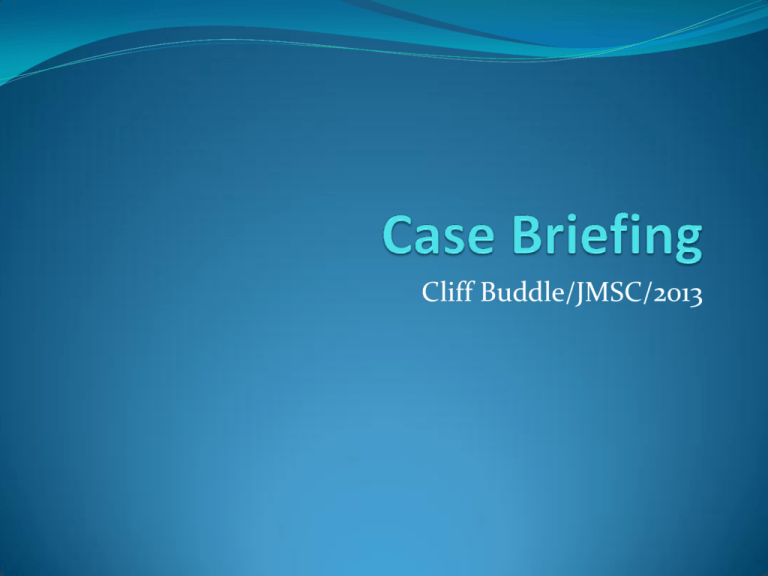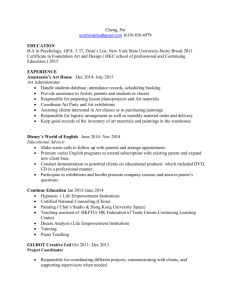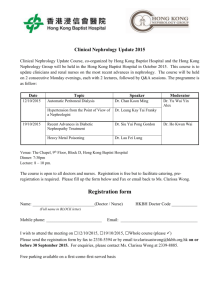Case Briefing
advertisement

Cliff Buddle/JMSC/2013 Assignment Select one of the two assigned cases Spiller v Joseph (UK, 2010) Yaqoob v Asia Times Online (HK, 2008) Read carefully Prepare a summary of the case 1250-1500 words Deadline: February 25 Electronic copy AND hard copy in class Outline and example of a brief to be found on the website – take a look! The importance of cases Especially important in common law jurisdictions Binding precedents established by the courts Applying principles established in earlier cases to the facts of the case before them Ratio Decidendi, Obiter Dicta Who decides what precedent has been set? Do judges make law? Reading a case Style differs from judge to judge But tend to follow a similar structure What is the history of the case? What are the facts? What are the legal issues to be decided? How are legal authorities used? How is legislation interpreted? What decision did the court make (who won?) How did it arrive at that decision (reasoning) If more than one judge, did they agree or disagree? The use of precedent Donoghue v Stevenson 1932 Ginger beer with a decomposing snail in it Was the manufacturer liable (no contract) Laid down foundational principle for law of negligence Expansion of duty of care Then, Grant v Australian Knitting Mills, 1936 Grant buys two pairs of long johns (underpants) Excess of sulphites in them causes him severe skin condition Can the precedent set in Donoghue v Stevenson (concerning a snail in ginger beer) be used to find the manufacturer of the underpants liable? Statutory interpretation Mothers from mainland China giving birth in Hong Kong Do their children have the right of abode in HK? Article 24 Basic Law The permanent residents of the Hong Kong Special Administrative Region shall be: ( 1 ) Chinese citizens born in Hong Kong before or after the establishment of the Hong Kong Special Administrative Region Does this include or exclude the children of visitors to Hong Kong? How is this to be decided? Briefing a case Carefully summarise… Facts Issues Rules Reasoning Individual cases illustrate legal concepts Thinking behind those concepts Case brief distills the essence of the case Elements of a brief Title and Citation Facts Procedural History Issues Reasoning Rule Holding Title and Citation Name of the case –Wong Yeung Ng v. Secretary for Justice Citation(s) –[1999] HKCA 382 –[1999] 2 HKLRD 293 –CACV161 / 1998 Facts of the case Key events leading to the lawsuit –1997: Oriental Press Group dissatisfied with indecency ruling by Obscene Articles Tribunal and outcome in unrelated copyright case against Apple Daily –Oriental Daily News, under chief editor Wong Yeung Ng, published a number of articles vilifying the judges involved and making threats against them –Oriental also sent paparazzi out to follow judge Procedural History Who filed the suit and how has it proceeded through the courts? –This case is in the Court of Appeal –At the trial court, Wong Yeung Ng was convicted on two counts (charges) of contempt of court and sentenced to four months’ imprisonment –Oriental Press Group also convicted and fined but is not appealing Issues What legal question(s) will the current court decide? “At issue…”, “…whether…” –In this case, in order to establish contempt of court (scandalising the judiciary), whether it is sufficient to find a “real risk” of undermining the due administration of justice Or whether a more stringent test of “real, substantial and imminent danger” is applicable Other issues Is it necessary for actions targeting Justice Godfrey to have influenced him in order to undermine public confidence in the administration of justice? Did Wong’s four-month sentence constitute excessive punishment? Reasoning What did the court decide and why? –Defining “necessary” exemptions to freedom of expression depends on the nature of the contempt –“Real risk” test sufficient because Hong Kong is part of Commonwealth tradition, which recognizes importance of preserving due administration of justice as a continuing process –Small size of jurisdiction means it is easy to communicate widely through one major news outlet –Hong Kong judiciary may be criticised freely, but not subjected to abuse (unreasonable, irrational) –Allowing such attacks to continue unchecked would undermine judiciary’s ability to function Reasoning What did the court decide and why? Other issues-- –Question of influence on Godfrey is not relevant, pursuit of him could create impression that he would be cowed –Sentence not excessive given persistence and serious nature of offences, mitigating factors were considered including acceptance of responsibility, apology and character of defendant Reasoning In cases with multiple judges, summarize consensus, concurring opinions and dissents, if any –Mayo: Even under the stricter test conviction would have been upheld –Leong: Concurring Legal basis for decision What sources of authority does the court cite? –Bill of Rights: restrictions on freedom of expression allowed if necessary for protection of public order –Precedents that distinguish what is and is not contempt Legal authorities Precedents –R v Koptyo (1988) 47 DLR (4th) 213 –R v Central Independent Television Plc [1994] Fam 192 –Ambard v A-G for Trinidad and Tobago [1936] AC 322 –R v Commissioner of Police of the Metropolis, ex p Blackburn (No 2) [1968] 2 QB 150 Legislation –Basic Law of Hong Kong SAR, Article 27 –Hong Kong Bill of Rights Ordinance Legal authorities Other sources –Canadian Charter of Rights and Freedoms –European Convention on Human Rights, Article 10 –International Convention on Civil and Political Rights, Article 19 –Arlidge, Eady & Smith on Contempt (2nd ed.) Holding What was the specific outcome? Who won, who lost? –Appeal dismissed –Wong’s conviction upheld –Wong to pay costs









